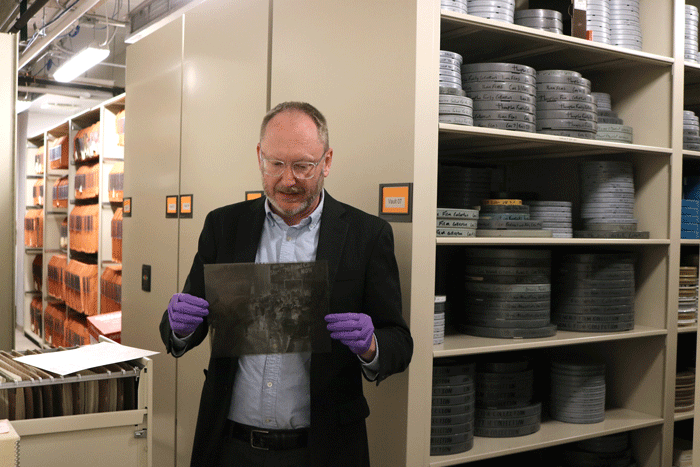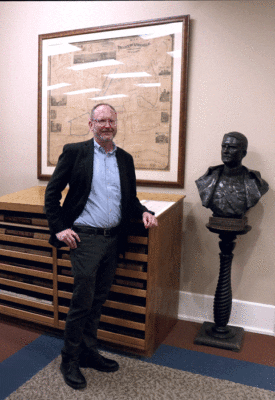Alumnus Eric Dawson Steps Into Calvin M. McClung Historical Collection Manager Position

Eric Dawson (’13) has been in the history-filled book stacks and climate-controlled rooms of the East Tennessee History Center ever since he was a student in the MSIS program at the University of Tennessee, Knoxville.
His experience there started in 2012 when he took on a practicum with Steve Cotham, manager at that time of the Calvin M. McClung Historical Collection, and, since 1999, official Knox County Historian. Soon after graduating with his MSIS, Dawson began an almost decade-long tenure in archival positions at the Tennessee Archive of Moving Image and Sound (TAMIS), the audio-visual department of McClung. Now, with Cotham’s recent retirement, Dawson has stepped into the manager position at the Collection, which is part of the Knox County Public Library. His work at TAMIS and at the Collection has been a fusion of all the things Dawson loves: history, books, artifacts, and so much more.
“I was always attracted to older things and history, especially when it came to things like film and music,” said Dawson, who earned an undergraduate degree from UT with a major in English creative writing, and minor in film studies.
Though his undergrad education set a foundation for what he would later do as a career, Dawson first spent some time traveling, working on-and-off at McKay’s book store, freelance writing, and working as an arts and entertainment editor and writer for the now-defunct alternative bi-weekly paper the “Knoxville Voice.” When that paper shuttered in 2009, a victim of the 2008 financial crisis, he began thinking about what to do next.
In 2011, he entered the master’s program at SIS with clear intentions to become an archivist. Information sciences had not been on his radar after earning his bachelor’s degree; but over the years, his experience and research had led him to the archivist career path—and it just so happened that his alma mater has a graduate degree in that field.
“I ended up discovering where so many of the things I was interested in are kept and cared for, and that archives are fun to dig around in. And obviously the explosion of these things becoming discoverable via the internet made me even more aware of this,” he said.
After his initial practicum with Cotham, Dawson undertook another practicum with TAMIS co-founders Bradley Reeves and (MSIS graduate and current Hodges Librarian) Louisa Trott. Post-graduation, he would stay on as a volunteer, and about a year later a position was created for a TAMIS archival assistant, giving Dawson his first official archives employment. He was eventually promoted to manager of TAMIS, which was his last job before becoming manager of the Collection.
While he is looking forward to envisioning the future of the McClung Collection, Dawson also appreciates looking back at the experiences that brought him to this moment in time. In particular he is thankful for the MSIS practicum opportunities that brought him through the doors of the East Tennessee History Center and were instrumental in shaping his career.
“I really appreciated that they encouraged the practicums, obviously, because that’s what led me here,” he states. “That’s absolutely the thing—take as many opportunities and engage as much as possible, that’s an important aspect of the program. The school works with the community and are is involved with so many different libraries, archives and associations.”
Moving into managing the Collection means a big change in leadership duties—he manages 23 people instead of one, and oversees several departments. While he says it may sound like lip service, Dawson is incredibly sincere when saying his first month as manager has been smooth due to the organized, efficient, and highly skilled staff.
While one of his favorite things about the Collection would be the thousands upon thousands of photographs and ephemera, he also truly enjoys working with both the employees and the patrons. Dawson credits collaborative group projects and work in the MSIS program with helping him cultivate valuable interpersonal skills that he’s been able to apply in his professional life.
“That’s not a skill, looking back on it, that’s really taught in a lot of disciplines or undergraduate work. The emphasis on collaborative work was something from the program I really like and took with me and appreciated,” he said.
Despite the somewhat seamless change of leadership, Dawson does feel the weight of his predecessor’s legacy. He elaborated that Cotham’s decades of work included: facilitating and overseeing an expansion that doubled the size of the historic 1874 federal Custom House, which was completed in 2004; making the move to create online digital collections; and increasing the genealogy resources and materials
“One can’t help but have that in one’s mind. I’ve used the word gravitas, that might be a little grand, but I’m very well aware of how important this collection is and the work he did and it can be a lot to process,” Dawson said. “People talk about filling shoes, but you don’t really fill those shoes.”
Though he’s barely dipped his toes into the waters of this position, one thing Dawson is planning is re-initiating programming to engage the public. The COVID-19 pandemic had stalled much of the in-person events TAMIS and the History Center used to host, but he foresees that picking back up again this year. More will develop as he finds his footing in this role, including building on the already sizable collection, and Dawson hopes to serve the community in a similar way as his predecessor did.
“The McClung Collection is big on genealogy, and we have a lot of print and online resources people can use,” Dawson says. “We see a lot of historians and scholars, but also a lot of people coming in to research their family history. I think that’s something that a lot of people here are proud of—we’re a great resource for researchers and academics from around the world, but also, so many people from the local community come in to discover their own family history.”